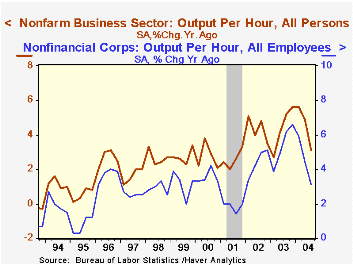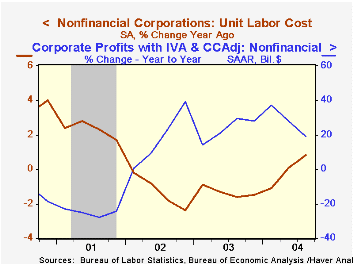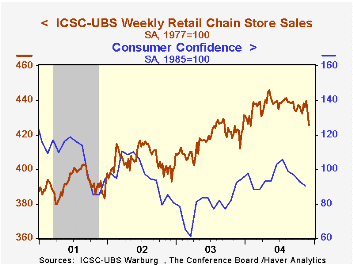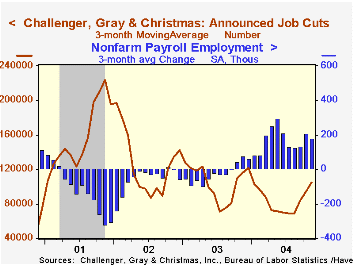 Global| Dec 07 2004
Global| Dec 07 2004U.S. Productivity Growth Little Revised for 3Q
by:Tom Moeller
|in:Economy in Brief
Summary
Non-farm labor productivity growth last quarter was little revised at 1.8% and about matched Consensus expectations for 2.0% growth. Growth in hours worked by all persons (employment times hours) was revised up to 2.4% (1.5% y/y) from [...]

Non-farm labor productivity growth last quarter was little revised at 1.8% and about matched Consensus expectations for 2.0% growth.
Growth in hours worked by all persons (employment times hours) was revised up to 2.4% (1.5% y/y) from 2.1% but output growth also was revised up to 4.2% (4.7% y/y), the same as in 2Q.
Unit labor costs grew 1.8% as compensation growth was left unchanged at 3.6% (4.0% y/y).
Productivity in the manufacturing sector was revised up to 4.6% (4.7% y/y) from 4.3%. Unit labor cost growth in the factory sector was revised down slightly to no change (-1.5% y/y).
In the nonfinancial corporate sector productivity growth accelerated to 4.2% (3.1% y/y) from 3.3% in 2Q. This is the first release of figures for 3Q. Output, a figure derived from the income side of the National Income & Product Accounts, grew at a 5.6% (4.8% y/y) rate versus 4.2% growth in 2Q. Hours worked grew at a 1.3% rate (1.7% y/y).
During the last ten years there has been an 86% (inverse) correlation between y/y growth in unit labor costs in the nonfinancial corporate sector and profit growth.
From The Federal Reserve Bank of Chicago is this paper titled "The acceleration in U.S. total factor productivity after 1995: The role of information technology."
| Non-farm Business Sector (SAAR) | 3Q '04 (Revised) | 3Q '04 (Prelim.) | 2Q '04 | Y/Y | 2003 | 2002 | 2001 |
|---|---|---|---|---|---|---|---|
| Output per Hour | 1.8% | 1.9% | 3.9% | 3.1% | 4.4% | 4.4% | 2.5% |
| Compensation | 3.6% | 3.6% | 5.9% | 4.0% | 4.1% | 3.3% | 4.0% |
| Unit Labor Costs | 1.8% | 1.6% | 1.9% | 0.8% | -0.4% | -1.1% | 1.5% |
by Tom Moeller December 7, 2004

Chain store sales following Thanksgiving week slumped another 1.7% on top of the 1.5% skid during the Holiday period, according to the International Council of Shopping Centers (ICSC)-UBS.
The decline pulled November sales just 0.1% ahead of October and sales began December down 2.5% m/m.
The leading indicator of chain store sales from ICSC fell by 0.5% in the latest week for the third time in the last four periods.
During the last ten years there has been a 60% correlation between y/y change in chain store sales and the change in non-auto retail sales less gasoline.
The ICSC-UBS retail chain-store sales index is constructed using the same-store sales reported by 78 stores of seven retailers: Dayton Hudson, Federated, Kmart, May, J.C. Penney, Sears and Wal-Mart.
| ICSC-UBS (SA, 1977=100) | 12/04/04 | 11/27/04 | Y/Y | 2003 | 2002 | 2001 |
|---|---|---|---|---|---|---|
| Total Weekly Chain Store Sales | 425.6 | 432.9 | 3.3% | 2.9% | 3.6% | 2.1% |
by Tom Moeller December 7, 2004

Job cut announcements reported in November rose 2.6% from October and 5.1% from a year ago according to Challenger, Gray & Christmas. The monthly tally of 104,530 pulled the three month moving average of job cut announcements to 104,744 (-9.7% y/y), the highest this year.
During the last ten years there has been an 86% (inverse) correlation between the three month moving average of announced job cuts and the three month change payroll employment.
Job cut announcements differ from layoffs. Many are achieved through attrition, early retirement or just never occur.
Job cut announcements in the automotive industry more than doubled and rose 10 fold in E-Commerce & Dot com to the highest level since January 2003. Government layoffs also surged and layoffs rose in insurance, electronics, services, telecommunication, transportation and energy.
| Challenger, Gray & Christmas | Nov | Oct | Y/Y | 2003 | 2002 | 2001 |
|---|---|---|---|---|---|---|
| Announced Job Cuts | 104,530 | 101,840 | 5.1% | 1,236,426 | 1,431,052 | 1,956,876 |
Tom Moeller
AuthorMore in Author Profile »Prior to joining Haver Analytics in 2000, Mr. Moeller worked as the Economist at Chancellor Capital Management from 1985 to 1999. There, he developed comprehensive economic forecasts and interpreted economic data for equity and fixed income portfolio managers. Also at Chancellor, Mr. Moeller worked as an equity analyst and was responsible for researching and rating companies in the economically sensitive automobile and housing industries for investment in Chancellor’s equity portfolio. Prior to joining Chancellor, Mr. Moeller was an Economist at Citibank from 1979 to 1984. He also analyzed pricing behavior in the metals industry for the Council on Wage and Price Stability in Washington, D.C. In 1999, Mr. Moeller received the award for most accurate forecast from the Forecasters' Club of New York. From 1990 to 1992 he was President of the New York Association for Business Economists. Mr. Moeller earned an M.B.A. in Finance from Fordham University, where he graduated in 1987. He holds a Bachelor of Arts in Economics from George Washington University.
More Economy in Brief
 Global| Feb 05 2026
Global| Feb 05 2026Charts of the Week: Balanced Policy, Resilient Data and AI Narratives
by:Andrew Cates






